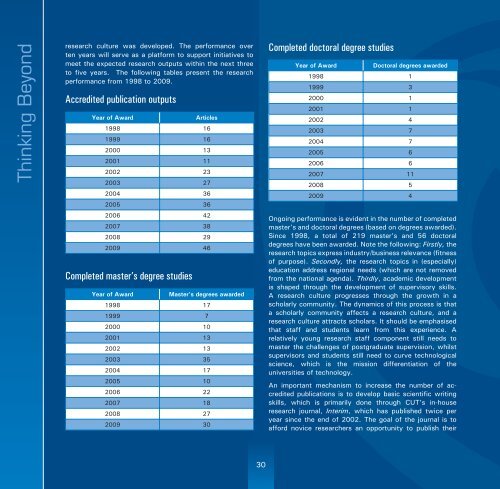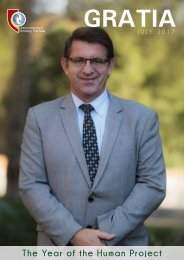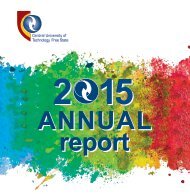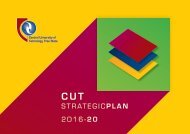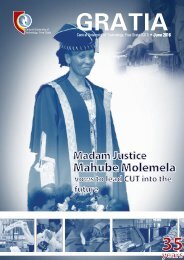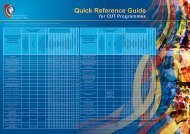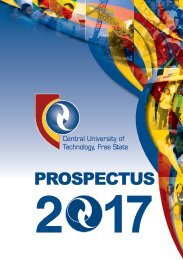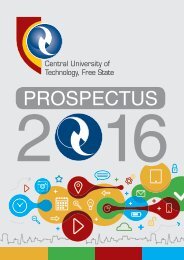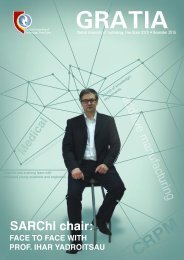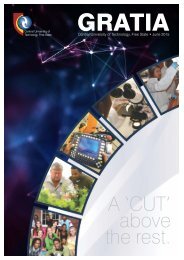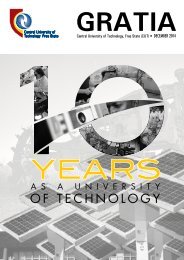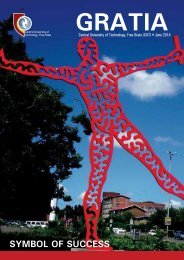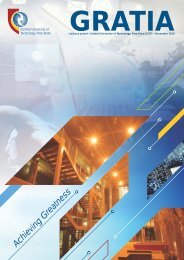CUT Annual Report 2009
The Annual Report is a premier publication that reports on institutional development and successes.
The Annual Report is a premier publication that reports on institutional development and successes.
You also want an ePaper? Increase the reach of your titles
YUMPU automatically turns print PDFs into web optimized ePapers that Google loves.
Thinking Beyond<br />
research culture was developed. The performance over<br />
ten years will serve as a platform to support initiatives to<br />
meet the expected research outputs within the next three<br />
to five years. The following tables present the research<br />
performance from 1998 to <strong>2009</strong>.<br />
Accredited publication outputs<br />
Year of Award<br />
Articles<br />
1998 16<br />
1999 16<br />
2000 13<br />
2001 11<br />
2002 23<br />
2003 27<br />
2004 36<br />
2005 36<br />
2006 42<br />
2007 38<br />
2008 29<br />
<strong>2009</strong> 46<br />
Completed master’s degree studies<br />
Year of Award<br />
Master’s degrees awarded<br />
1998 17<br />
1999 7<br />
2000 10<br />
2001 13<br />
2002 13<br />
2003 35<br />
2004 17<br />
2005 10<br />
2006 22<br />
2007 18<br />
2008 27<br />
<strong>2009</strong> 30<br />
Completed doctoral degree studies<br />
Year of Award<br />
Doctoral degrees awarded<br />
1998 1<br />
1999 3<br />
2000 1<br />
2001 1<br />
2002 4<br />
2003 7<br />
2004 7<br />
2005 6<br />
2006 6<br />
2007 11<br />
2008 5<br />
<strong>2009</strong> 4<br />
Ongoing performance is evident in the number of completed<br />
master’s and doctoral degrees (based on degrees awarded).<br />
Since 1998, a total of 219 master’s and 56 doctoral<br />
degrees have been awarded. Note the following: Firstly, the<br />
research topics express industry/business relevance (fitness<br />
of purpose). Secondly, the research topics in (especially)<br />
education address regional needs (which are not removed<br />
from the national agenda). Thirdly, academic development<br />
is shaped through the development of supervisory skills.<br />
A research culture progresses through the growth in a<br />
scholarly community. The dynamics of this process is that<br />
a scholarly community affects a research culture, and a<br />
research culture attracts scholars. It should be emphasised<br />
that staff and students learn from this experience. A<br />
relatively young research staff component still needs to<br />
master the challenges of postgraduate supervision, whilst<br />
super visors and students still need to curve technological<br />
science, which is the mission differentiation of the<br />
universities of technology.<br />
An important mechanism to increase the number of accredited<br />
publications is to develop basic scientific writing<br />
skills, which is primarily done through <strong>CUT</strong>’s in-house<br />
research journal, Interim, which has published twice per<br />
year since the end of 2002. The goal of the journal is to<br />
afford novice researchers an opportunity to publish their<br />
30


